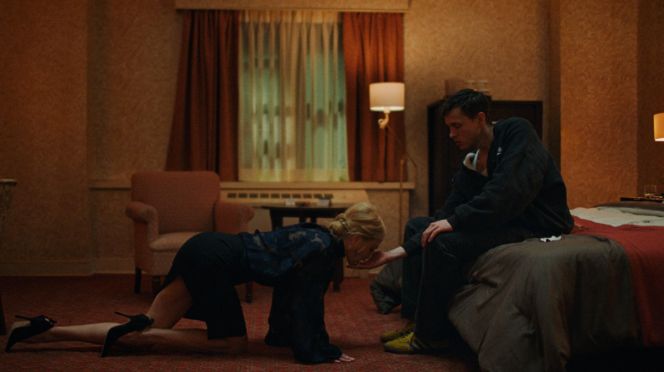MOVIE REVIEW – Romy (Nicole Kidman), the commanding and methodical CEO of a robotics company, runs her business with the same measured precision she demands from her machines. On the surface, her personal life appears just as well-structured: she’s happily married to Jacob (Antonio Banderas), a respected theater director, with whom she raises two daughters, Isabel (Esther McGregor) and Nora (Vaughan Reilly). Yet, something remains unfulfilled—namely, that elusive, capital-letter climax Jacob’s attentiveness and playfulness can’t quite provide. After their encounters, Romy routinely retreats to another room, finishing what he couldn’t—watching online porn, muffling her moans with her own hand.
At the height of her success but still unsatisfied in this regard, Romy is both composed and unraveling, a woman on the verge of something unpredictable. That moment arrives in the form of an unexpected encounter that shatters the smooth rhythm of her routine.
Enter Samuel (Harris Dickinson), whom Romy first sees outside her New York office building as he calms an aggressive female dog that was charging toward her. Babygirl plays this scene with deadpan seriousness, making it all the more absurd—Samuel is introduced as a man who can tame a bitch, both literally and figuratively. Soon, it turns out he’s not just some random passerby but a newly appointed intern at Romy’s company, and to her dismay, he specifically requests her as his mentor. She resists at first—she didn’t even want to be part of this program—but ultimately gives in and agrees to meet with him.
From their very first interactions, it’s clear that humility is not one of Samuel’s strengths. His confidence borders on outright audacity, and while his aggressive forwardness might seem unrealistic in real life, in the film, it fuels the tension that draws out Romy’s long-repressed desires. Though she quickly shuts him down—“Your behavior is completely inappropriate”—the barely concealed attraction between them is evident from the start.
The Game of Power and Desire
Writer-director Halina Reijn masterfully navigates the razor-thin balance between passion, tension, and dark humor while keeping Romy’s journey grounded. A commanding figure in the corporate world, Romy seeks something radically different in her personal life: though she projects an image of absolute authority, she is drawn to surrendering control—specifically to this brazenly self-assured twenty-something intern. Babygirl subverts what could have been a clichéd premise, layering it with unexpected nuances and shifting power dynamics.
Romy and Samuel’s relationship unfolds as both an erotic affair and a corporate power struggle, where control continuously shifts back and forth. The chemistry between Kidman and Dickinson is electric, and the film steadfastly refuses to simplify or over-explain the complexities of their dynamic. Their first physical encounter takes place in a rundown motel, where Romy initially resists Samuel’s commands before gradually giving in—not as an act of submission, but as a shared exploration in which neither party fully understands what they’re seeking. This ambiguity fuels the film’s ever-present, crackling tension, a live wire of unpredictability running through every scene.
In lesser hands, Romy could have easily become a tired archetype—the domineering boss secretly craving submission. But Kidman and Reijn craft a far more intricate portrait. The film subtly suggests that Romy’s compulsions stem from a childhood spent in a cult (a nod to Reijn’s own past), and frames her recklessness as the byproduct of overlapping desires: the longing to remain young (hence the Botox and cryo-chamber sessions), to be impulsive and wild, to experience true satisfaction, and to confront uncharted aspects of herself.
Lost in the Labyrinth of Desire
Kidman delivers a raw, layered performance, embodying Romy’s passionate turmoil with such natural ease that the audience is pulled into her internal conflict. What makes it even more captivating is Romy’s willingness to plunge headfirst into the chaotic circumstances she herself has created, fully aware that she’s risking everything she holds dear. Babygirl is bold in its refusal to sugarcoat or romanticize; it lays Romy bare—both literally and figuratively—embracing the humorous, absurd, and at times, deeply uncomfortable sides of her predicament.
The film is too clever to moralize and too intricate to boil down into a simple equation. One of its greatest strengths is how it refuses to provide a one-dimensional reading of its characters’ power struggles. Jacob, Romy’s husband, isn’t some passionless, neglectful partner—he’s caring and affectionate, which makes Romy’s choices all the more layered. Meanwhile, Dickinson plays Samuel with a fascinating duality: he is charismatic and domineering, yet simultaneously immature and oblivious—treating their affair as nothing more than another game. The film consistently sidesteps easy conclusions, neither justifying nor condemning its characters but instead presenting them in all their contradictions.
Reijn and cinematographer Jasper Wolf employ an unsteady, handheld camera style that mirrors Romy’s emotional instability, while Cristobal Tapia de Veer’s score pulses with hypnotic beats and breathy gasps, amplifying the film’s sensual unease. There’s an undeniable playfulness in Babygirl’s tone—provocative, thrilling, and laced with irony. Nowhere is this clearer than in a key sequence set to George Michael’s “Father Figure”—a scene that brilliantly walks the line between erotic intensity and sheer absurdity.
The film’s self-awareness is also evident in Samuel’s proclamation that their relationship is “about giving and taking power,” to which Romy dryly responds: “Did you go to the library to look that up?” It’s moments like this that make Babygirl feel so human—its characters aren’t always sure why they make the choices they do, and the boundaries between power, desire, and love constantly shift.
Whether Romy is downing a glass of milk that Samuel sends over during a late-night office drinks session or surrendering to his every demand both in and out of the workplace, the narrative spirals deeper into a web of self-destructive passion. The situation grows even more precarious when Romy discovers that Samuel is also sleeping with her assistant, Esme (Sophie Wilde), whose ambitions for a promotion only add another volatile layer to this dangerous game.
Bold Choices, Unavoidable Consequences
Reijn’s screenplay deliberately avoids the obvious path, painting Romy and those around her as ambitious risk-takers in both their public and private lives. The film remains committed to its nuance: it neither absolves its characters nor passes judgment, instead leaving the audience to wrestle with its implications. Babygirl ends as provocatively as it begins—its characters’ futures left deliberately unresolved, their choices reverberating beyond the film’s final frame.
-Herpai Gergely “BadSector”-
Babygirl
Direction - 8.4
Actors - 8.6
Story - 8.2
Music/Audio - 8.6
Ambience - 8.1
8.4
EXCELLENT
Babygirl is a daring and provocative piece of filmmaking, one that walks a razor-thin line between power and desire with remarkable intelligence. Nicole Kidman’s flawless performance adds immense depth to Romy, making her struggles both painfully human and deeply unsettling. Halina Reijn’s film is not only thrilling and provocative but also a mature, incisive exploration of female agency in all its messy, contradictory glory.


















Leave a Reply